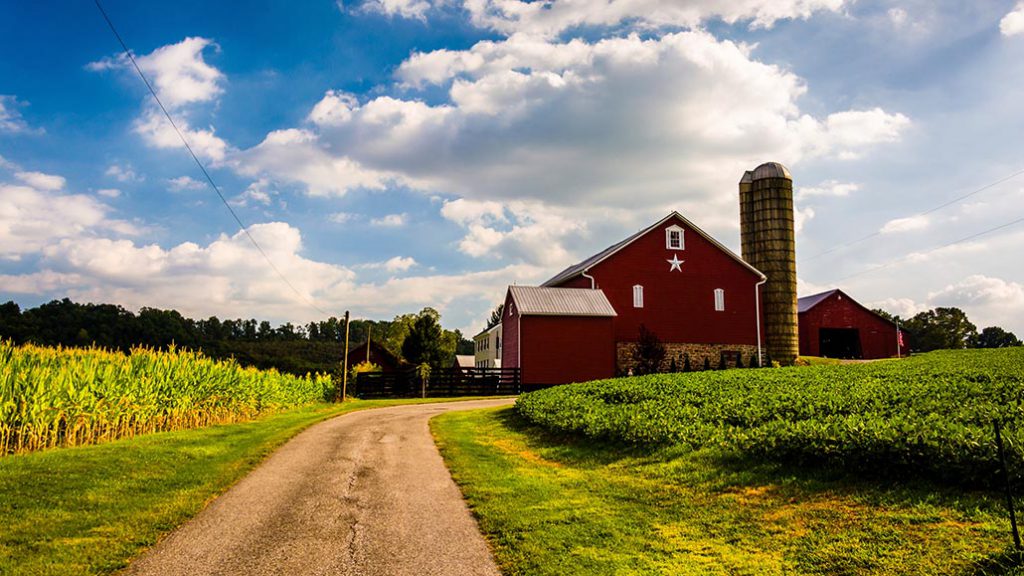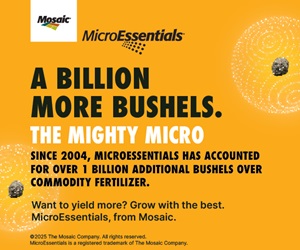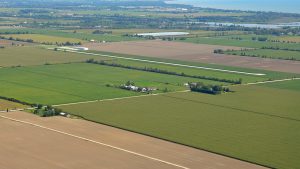A sustainable future
GRAIN FARMERS’ COMMITMENT TO THE ENVIRONMENT

LIKE ANY BUSINESS owners, grain farmers want to be profitable; but they are also stewards of their land — protecting the soil, water, and ecosystem that their farm needs today and for future generations. Grain Farmers of Ontario participates in several initiatives designed to support the adoption of environmentally sustainable farming practices with our farmer-members. These initiatives are designed to ensure we remain a strong competitor in a global marketplace while protecting the environment. Here are a few highlights of the initiatives Grain Farmers of Ontario is involved with.
ENVIRONMENTAL COLLABORATION ONTARIO
Environmental Collaboration Ontario is made up of agriculture organizations, including Grain Farmers of Ontario, that recognize the need to work together on environmental sustainability issues. The group is currently focused on reducing phosphorus runoff into Lake Erie.
One strategy being utilized is the 4R Nutrient Stewardship program — encouraging farmers to apply the right source of plant nutrition, at the right rate, at the right time, and in the right place to improve nutrient use efficiency and reduce any potential nutrient loss.
Grain Farmers of Ontario is also educating farmers about how improved soil management, through the use of field mapping and soil testing, can help them make best nutrient management decisions. These decisions can help improve a farm’s bottom line, while also benefitting the environment.
Cover crops are another important tool being utilized by grain farmers to improve soil health and reduce runoff. Ensuring a field always has green cover reduces soil erosion and nutrient losses, while adding organic matter to soil.
Environmental Collaboration Ontario videos can be viewed on the Grain Farmers of Ontario YouTube channel www.youtube.com/grainfarmersontario.
Environmental Collaboration Ontario was formerly known as Grow Ontario Together.
BEE HEALTH
Protecting bee health through best management practices and the use of new technology has been a priority for Grain Farmers of Ontario and its farmer-members.
All corn and soybean farmers in Ontario changed the way they plant seeds treated with neonicotinoids after bee death incidents were documented in 2012. This includes the use of deflectors on air seeders and a fluency agent designed to keep the treatment on the seed as it moves through the planter. After years of collecting data on bees, the Pest Management Regulatory Agency’s 2018 neonicotinoid pollinator risk assessments showed that these practices worked to protect bees.
In addition to these changes in practices by our farmer-members, Grain Farmers of Ontario is an active member of Canada’s Bee Health Roundtable (a multi-stakeholder forum formed to address issues facing bee health) and supports Bees Matter (a partnership designed to raise awareness about the important role bees play in the eco system and how everyone has a role to play in ensuring a healthy environment for pollinators).
The website www.beesmatter.ca is one of several initiatives to work together with beekeepers, scientists, environmentalists, and everyday Canadians to improve honey bee health.
Another initiative is Buzzing Gardens – free garden seeds are provided to increase the amount of pollinator friendly habitat across the country. This helps to address the issue of poor nutrition which is a significant factor in bee health. Grain Farmers of Ontario handed out hundreds of the seed packets and information about Bees Matter during the Canadian National Exhibition in Toronto this summer.
SAI PLATFORM
Ontario grain farmers are committed to sustainable practices as stewards of the land. Through the adoption of several best practices including minimum tillage, precision agriculture, and variable rate technology, farmers have been able to reduce the amount of inputs used while still preserving the highest level of quality. Since 1981, land use efficiency has increased 39% in corn, 17% in soybeans, and 37% in winter wheat. We have also seen a decrease in the energy required to grow and harvest crops with a 43% decline in corn, 28% decline in soybeans, and 37% decline in wheat.
Knowing the sustainable practices our farmers are undertaking and the increased demand by end users for sustainably grown commodities, Grain Farmers of Ontario became members of the Sustainable Agriculture Initiative (SAI). The SAI Platform is a global food and drink industry initiative which supports the development of sustainable agriculture worldwide. Their Farm Sustainability Assessment (FSA) evaluates farmers in the areas of economic, environmental, and social sustainability. Based on their farm operations, farmers are given a rating of ‘not yet Bronze’, ‘Bronze’, ‘Silver’, or ‘Gold’.
Grain Farmers of Ontario has worked to streamline the FSA process for Ontario farmers by incorporating local legislation and provincial regulations to increase the tool’s ease of use and reduce duplicate questions. Through this work, all farmers in Ontario now have a base-line compliance at the Bronze level, acknowledging the common sustainability practices farmers follow.
This year, Grain Farmers of Ontario has worked to promote ways to increase biodiversity on the farm, including the preservation of wetlands and woodlots. The FSA asks farmers to answer questions on biodiversity and whether there is a plan to protect and preserve biodiversity on the farm. Being able to answer these questions positively can increase a farmer’s result on the FSA scale.
“Grain and oilseed farmers are employing sustainable practices on their farms and the SAI Platform is a credible vehicle to validate this with the market and the public,” says Michael Buttenham, sustainability and environment coordinator for Grain Farmers of Ontario. “We support the SAI Platform because of its cross-commodity approach to connecting supply chain partners in multiple regions around the world.” •






















